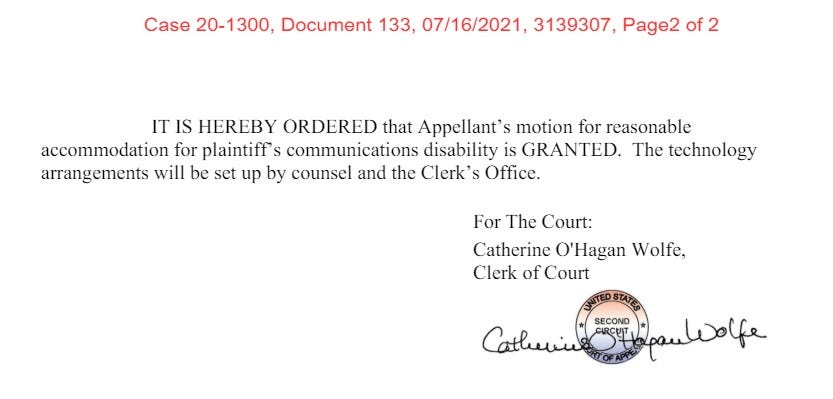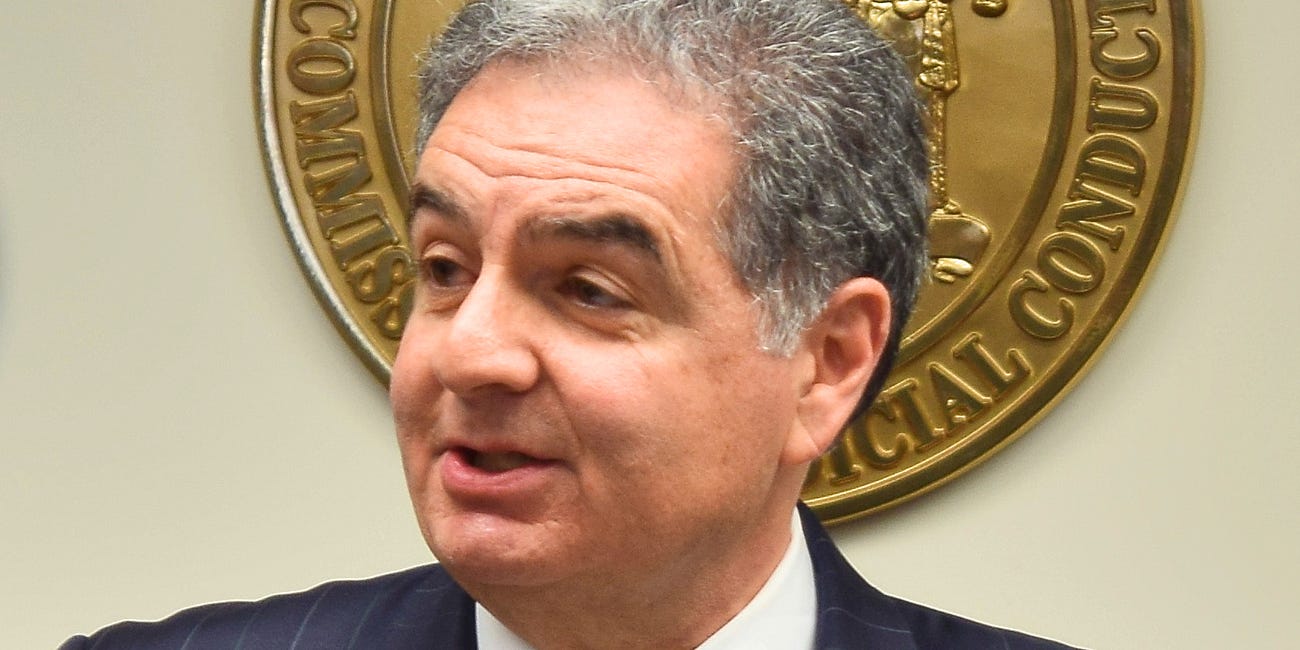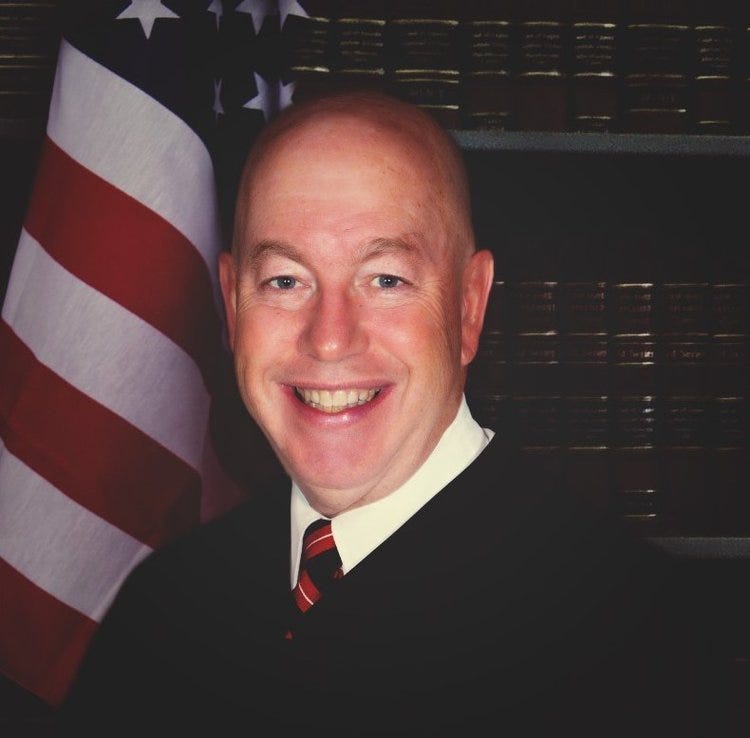The Untouchable: How Robert H. Tembeckjian Shields Corrupt Judges in New York State
Disabled Person and Veteran Advocate Marc Fishman's Westchester Family Court Struggle Exposes Inaction and Bias in NYS Commission on Judicial Conduct
By Dick LaFontaine, Rick LaRivière, and Frankie Pressman
Robert H. Tembeckjian’s tenure as Administrator and Counsel to the New York State Commission on Judicial Conduct is marred by a consistent failure to address serious judicial misconduct. His selective enforcement and protection of politically connected judges erode the integrity of New York's judicial system.
The Westchester County Family Court case of disabled person and veteran advocate Marc Fishman starkly illustrates how Tembeckjian and the Commission’s inaction perpetuates discrimination and injustice in the New York Judiciary. Fishman took his case against corrupt judges to Federal Court - and won the right to reasonable accommodations.

Fishman faced severe discrimination in the Westchester Family Court system. This article delves into Fishman's plight and illustrates how Tembeckjian’s actions—or lack thereof—protect corrupt judges and undermine justice.
Fishman says that Judges Michelle I. Schauer, Susan M. Capeci, and David S. Zuckerman improperly, brazenly, and repeatedly denied his requests for reasonable accommodations in the New York State Courts under the Americans with Disabilities Act.

Their intentional malfeasance led to significant legal and personal repercussions, Fishman claims. He continues to use the court process to prove the full extent of the harm and obtain unequivocal evidence of intentional disability discrimination and misconduct from the New York State Courts and other governmental entities.

Fishman says he’s compelled to go this route because Tembeckjian and the Commission will not do their job, police corrupt judges, and protect vulnerable New Yorkers.
“If Attorney and Administrator Robert H. Tembeckjian cannot protect New York's most vulnerable disabled veterans from judicial misconduct, then we need a new head of the Commission of Judicial Conduct,” Fishman said.
The disabled veteran advocate’s fight is igniting a firestorm, raising crucial questions about New York’s system of judicial accountability, oversight, and removal.
Who watches the Watchers?
Who is Robert H. Tembeckjian?
In New York State, if you believe that your judge was biased and discriminated against you, that they took a bribe from your adversary’s better-connected lawyers to tank your case, or that your children were trafficked in a Family Court Cash for Kids scheme, your recourse is to the New York State Commission on Judicial Conduct. The N.Y.S. Constitution established the Commission to investigate and prosecute complaints filed against New York judges.
Robert H. Tembeckjian has been the Administrator and Counsel to the New York State Commission on Judicial Conduct since 2003 and has been on staff since 1976. Many laud his decades of work and zealous activity in maintaining public confidence in the judiciary
“There is no time constraint in New York on examining unethical behavior that might render a judge morally unfit to remain in office,” Tembeckjian said in 2018.
Critics, however, claim that, under Tembeckjian’s watch, certain politically connected judges “skate” on serious and even criminal misconduct. They claim Tembeckjian has a well-documented history of failing to hold judges accountable for serious misconduct.
Who is Robert H. Tembeckjian: The Political Hack Protecting New York's Corrupt Judiciary?
By Dick LaFontaine, M. Thomas Nast, and Frankie Pressman In New York State, if you believe that your judge was biased, that they took a bribe from your adversary’s better-connected lawyers to tank your case, or that your children were trafficked in a Family Court Cash for Kids scheme
We recently covered a June 28, 2024, letter to the Commission by Richard Luthmann, a contributor to this outlet. Luthmann levied charges that Tembeckjian engaged in prohibited dishonesty and a cover-up of Richmond County Supreme Court Justice Ronald Castorina’s malfeasance and crimes:
Concerning Castorina, you sent him a letter about the above-referenced complaint. Your letter stated:
“The Commission dismissed the complaint as unsubstantiated.”
Your statements in said letter are dishonest and false.
I am informed that the Commission “skirted” the Castorina perjury issue by stating that Castorina’s alleged conduct was not sufficiently related to judicial functions and thus was not reviewable by the Commission. That is not the same as “unsubstantiated.” I would know better if my copy of the Commission’s decision wasn’t “gutter-served” on me.
The Commission never explicitly stated that Castorina didn’t lie under oath and perjure himself. The Commission never explicitly stated that Castorina didn’t engage in felonious conduct.
Such alleged misconduct is so serious that Castorina's honesty, trustworthiness, and fitness, as documented, are, per se, ethical malfeasances that require reporting.
Let’s not mince words. You are lying for Castorina in this act of “judicial fellatio.” That is troubling. It is also an ethical violation of the Rules of Professional Conduct Rule 8.4 (b), (c), and (d). [emphasis added]
Luthmann saidTembeckjian and the members of the Commission are engaged in willful blindness or worse. The case of Westchester father and disabled person and veteran advocate Marc Fishman corroborates his claims.
Fishman's Battle for Disability Accommodations
Marc Fishman, a disabled person and veteran advocate, has been entangled in a protracted legal battle to secure reasonable accommodations under the Americans With Disabilities Act (ADA) from the Westchester Family Court. Fishman, who suffers from traumatic brain injury and associated cognitive and hearing impairments, repeatedly requested accommodations such as real-time transcription to aid his participation in court proceedings. At stake are the safety and welfare of his children in the Westchester Family Court.
Despite these clear needs and the legal mandates supporting them, Judges Michelle I. Schauer, Susan M. Capeci, and David S. Zuckerman denied his requests, leading to significant legal and personal repercussions for Fishman.
Judge Michelle I. Schauer
Judge Michelle I. Schauer showed repeated and blatant disregard for Fishman’s legal rights and state and federal laws designed to protect individuals with disabilities.
In 2017, Fishman formally requested that Judge Michelle I. Schauer be recused from his case due to her persistent refusal to accommodate his disabilities. In a letter to the New York State Supreme Court Appellate Division, Fishman documented her handling of his Family Court case.
Despite Fishman’s evident cognitive and hearing disabilities, Schauer repeatedly denied his ADA accommodation requests, including the use of a note-taker and real-time transcription, essential for his effective participation in court proceedings. Her retaliatory actions included jailing Fishman for sending gifts to his children despite a Court Order permitting such actions.
Schauer also failed to issue a final order after 37 months of litigation, preventing Fishman from appealing her decisions. Furthermore, she violated federal HIPAA law by refusing to release Fishman’s medical records. She ignored federal ADA requirements by dismissing his requests for disability accommodations, claiming he was not “disabled enough.”
Judge Susan M. Capeci
Judge Susan M. Capeci received notoriety when she presided over the Catherine Kassenoff case. Kassenoff, a former federal prosecutor who had terminal cancer, was engaged in a bitter divorce with ex-husband Allan Kassenoff, a high-powered New York attorney formerly with the Greenberg Traurig law firm.
Kassenoff said her husband was an abuser, manipulating the legal system to wrench away their children and tarnish her reputation.
Allen Kassenoff succeeded. On May 4, 2023, Judge Capeci decreed, “[a]ll visitation between the parties’ children… and the defendant mother is suspended until further Order of the Court.”
Judge Capeci’s decision cut Catherine Kassenoff off from contact with her three daughters, ages 9, 12, and 13. A few weeks later, on May 27, Catherine died by assisted suicide in Switzerland.

“It is with a profound heartbreak … that I am writing my last post ever. Today, I will be ending my own life … In the last four years of my life I have woken up every day to a nightmare like no other,” she wrote in her public suicide note.
Despite having no criminal history, mental health issues, or history of substance misuse, Catherine claimed the court took her home, her dogs, and her life savings while continuing to deny her visits with her children.
“I cannot survive this torment and the grief that comes from such a prolonged separation from my children,” she wrote. “The court system did this to me … It is a predatory system that functions in darkness — through ‘gag orders’ like the one in my case, through a publicly-inaccessible docket, through a closed courtroom, and through ex parte ‘temporary’ orders that are in place for years.”
Judge Capeci exhibited blatant bias and discrimination in her handling of Fishman's case by imposing excessively high costs for supervised visitation, costs that nondisabled parents were not subjected to.
Capeci ordered Fishman to spend thousands on services that were otherwise available for free to other disabled parents, including supervised visitation providers and additional transportation expenses. Capeci's refusal to utilize free or lower-cost services for disabled individuals demonstrated a severe abuse of judicial power and a complete disregard for federal and state disability laws.
Her actions caused significant financial and emotional strain on Fishman, highlighting a profound failure to uphold the principles of fairness and equality mandated by the ADA, other federal and state human rights laws and regulations, and the canons of judicial ethics.
Judge David S. Zuckerman
Judge David S. Zuckerman's judicial misconduct and malfeasance are evident in his handling of Fishman's case criminal case. Fishman was charged with violating a Family Court Order of Protection.
Judge Zuckerman's order withheld exonerating evidence during Fishman's criminal trial. This evidence indicated that Fishman had not been served with the Order of Protection he was accused of violating.
Fishman argues that the decision to withhold this critical information directly contravened the principles of due process and fair trial. “It illustrates Zuckerman’s blatant bias, failure to uphold legal standards, and corrupt cover-up of the misdeeds of other judges and government officials,” Fishman said.
Fishman contends Judge Zuckerman’s egregious action undermined Fishman's defense and highlighted Zuckerman's disregard for the ethical responsibilities of his judicial office.
Judicial Discrimination, Retaliation, and Documentation
Fishman's allegations are not isolated complaints but are supported by extensive documentation. For example, in a motion filed in federal court, Fishman detailed his cognitive deficits and hearing difficulties, supported by letters from medical professionals at the Center for Cognition and Communication. These documents confirmed that Fishman required the CART (Computer Aided Real Time Transcription) system to effectively participate in court proceedings due to his memory and verbal functioning impairments.
Fishman’s struggle eventually led him to file a lawsuit against the Office of Court Administration and the involved judges. The Federal Appeals Court ultimately agreed. However, despite this compelling evidence, the Westchester Family Court repeatedly ignored Fishman's requests for years.
In one hearing, an ADA advocate representing Fishman noted the continuous stream of requests for disability accommodations that went unaddressed by the court. This persistent neglect culminated in significant legal setbacks for Fishman, including wrongful convictions and continued discrimination. The New York State Court system failed to provide the necessary auxiliary aids mandated by the ADA and a panoply of other federal and state civil rights laws.
In 2021, the U.S. Court of Appeals for the Second Circuit ruled in Fishman’s favor, ordering that the necessary ADA accommodations be provided. This ruling highlighted the severe discrimination Fishman faced and the systemic failures of the New York State court system to uphold the rights of disabled litigants.
Tembeckjian’s Role in Protecting Corrupt Judges
Despite the federal court’s findings and the clear evidence of judicial misconduct, Robert H. Tembeckjian, as the head of the Committee, took no action against Judges Schauer, Capeci, or Zuckerman. This inaction is consistent with Tembeckjian’s track record of shielding politically connected judges from accountability.
Tembeckjian’s failure to act compromised the integrity of the judicial system and violated the Rules of Professional Conduct (RPC) 8.4, which prohibits discrimination based on disability. RPC 8.4 (f) clearly states,
“It is professional misconduct for a lawyer to... engage in conduct that the lawyer knows or reasonably should know is harassment or discrimination on the basis of... disability.”
By ignoring the documented discrimination against Fishman, Tembeckjian himself engaged in misconduct, failing to maintain the integrity of the legal profession and the judiciary. His refusal to hold judges accountable for their discriminatory actions against Fishman reveals deeper issues of corruption within the Committee.
Tembeckjian’s History of Selective Enforcement
Tembeckjian’s selective enforcement extends beyond Fishman’s case. Critics argue that under his leadership, the Committee has consistently protected judges with political connections while harshly punishing those without such ties for minor infractions. This pattern undermines public confidence in the judiciary and perpetuates corruption within the system.
For instance, Ronald Castorina, another judge under Tembeckjian’s purview, committed perjury before a grand jury in 2018. Despite clear evidence of his misconduct, Tembeckjian dismissed the complaint. The basis for dismissing the complaint was that Castorina’s alleged conduct was not judicial in nature. The Commission’s letter stated there was “an insufficient indication of judicial misconduct to justify judicial discipline.”
But this is a fundamental misapplication of the law and the rules. Why? Because Tembeckjian said so himself in the Washington Post on September 25, 2018.
In his article, “Yes, we can investigate decades-old allegations against judges. I’ve done it.” Robert Tembeckjian states that Judges can be investigated, disciplined, and removed for misconduct predating their judicial service. This includes actions from decades ago, such as Bryan R. Hedges, who was removed for abusing his niece 40 years prior.
Tembeckjian noted, “There is no time constraint in New York on examining unethical behavior that might render a judge morally unfit to remain in office.” He emphasized the importance of fair and thorough investigations, even for historical allegations, to maintain public confidence in the judiciary.
He pointed out the lack of a federal equivalent to state commissions for disciplining judges and called for change. “The federal court system has no equivalent to the independent state commissions,” Tembeckjian stated. These commissions, he argues, ensure accountability and uphold judicial integrity.
Tembeckjian lauds the integrity and transparency of the judicial conduct oversight process in New York State. He states, "Judges have to be free of conflicts of interest... act in a manner that promotes public confidence."
However, the facts show a different story. Neither Tembeckjian nor the Commission is accountable to anyone, and as a result, the Commission and the N.Y.S. Courts enjoy little public confidence.
We contacted Robert H. Tembeckjian, the NYS Commission on Judicial Conduct, and the NYS Office of Court Administration for comment. As of press time, no response had been received.
Public Outcry and Demand for Accountability
The public and legal community’s frustration with Tembeckjian’s actions is palpable. Marc Fishman himself has been vocal about the need for accountability.
“If Robert H. Tembeckjian cannot protect New York's most vulnerable disabled veterans from judicial misconduct, then we need a new head of the Commission of Judicial Conduct,” Fishman said.
The disabled person and veteran advocate’s call for change echoes the sentiments of many who have observed the Committee’s failure to uphold justice and integrity under Tembeckjian’s leadership.
The NYS Committee on Judicial Conduct must prioritize integrity and fairness to restore public trust in the judiciary. This includes holding judges accountable for their actions, regardless of their political connections, and ensuring that all litigants, especially those with disabilities, are treated with the dignity and respect they deserve under the law.
As Fishman’s case demonstrates, the current system under Tembeckjian’s leadership fails to meet these fundamental standards of justice and equality.













